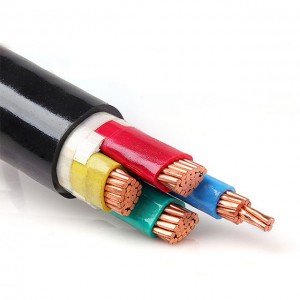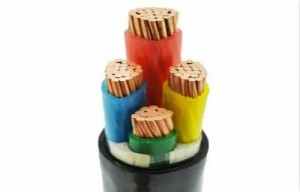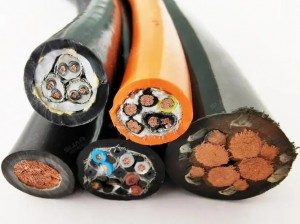The cable jacket is the outermost layer of the cable. It serves as the most important barrier in the cable to protect the safety of the internal structure and protects the cable from mechanical damage during and after installation. Cable jackets are not meant to replace the reinforced armor inside the cable, but they can provide a fairly high level, albeit limited, means of protection. Additionally, cable jackets provide protection from moisture, chemicals, UV rays, and ozone. So, what materials are used for cable sheathing?
1. Cable sheath material: PVC
Cable materials are particles prepared by mixing, kneading and extruding polyvinyl chloride as the base resin, adding stabilizers, plasticizers, inorganic fillers such as calcium carbonate, auxiliaries and lubricants.
PVC can be formulated for use in a variety of environments and applications. It is cheap to use, flexible, reasonably strong, and has fire/oil resistant materials.
However, this material contains harmful substances to the environment and human body, and there are many problems when used in special environments. With the enhancement of people’s environmental awareness and the improvement of material performance requirements, higher requirements have been put forward for PVC materials.
2. Cable sheath material: PE
Due to its excellent electrical insulation properties and good processing properties, polyethylene is widely used as a coating material for wires and cables, and is mainly used in the insulation layer and sheath layer of wires and cables.
Excellent electrical properties and extremely high insulation resistance. Polyethylene can be hard and very stiff, but low-density PE (LDPE) is more flexible and extremely resistant to moisture. Properly formulated PE has excellent weather resistance.
The linear molecular structure of polyethylene makes it easy to deform at high temperatures. Therefore, in PE applications in the wire and cable industry, polyethylene is often cross-linked into a network structure, making it highly resistant to high temperatures. Resistance to deformation.
Cross-linked polyethylene (XLPE) and polyvinyl chloride (PVC) are both used as insulation materials for wires and cables, but XLPE wires and cables are more environmentally friendly than PVC wires and cables and have better performance.
3.Cable sheath material: PUR
PUR cable is one type of cable. The material of PUR cable has the advantages of oil resistance and wear resistance, while PVC is made of ordinary materials. In the cable industry in the past few years, polyurethane has become increasingly important. At a certain temperature, the material’s mechanical properties are similar to rubber. The combination of thermoplasticity and elasticity results in TPE thermoplastic elastomer.
It is widely used in industrial machinery and equipment, transmission control systems, various industrial sensors, testing instruments, electronic equipment, household appliances, electromechanical, kitchen and other equipment, and is used for power supply and signal connections in harsh environments, oil-proof and other occasions.
4. Cable sheath material: TPE/TPR
Thermoplastic elastomers provide excellent low-temperature properties without the expense of thermosets. It has good chemical and oil resistance and is very flexible. Good wear resistance and surface texture, but not as durable as PUR.
5. Cable sheath material: TPU
Polyurethane cable refers to a cable that uses polyurethane material as insulation or sheath. Its super wear resistance refers to the super wear resistance of the cable sheath and insulation layer. The polyurethane material used in cables, commonly known as TPU, is a thermoplastic polyurethane elastomer rubber. Mainly divided into polyester type and polyether type, with hardness range (60HA-85HD), wear resistance, oil resistance, transparency, and good elasticity. TPU not only has excellent high wear resistance, high tension, high tensile strength, toughness and It has aging resistance and is a mature environmentally friendly material.
The application areas of polyurethane sheathed cables include marine application cables, industrial robot and manipulator cables, port machinery and gantry crane drum cables, and mining engineering machinery cables.
6. Cable sheath material: Thermoplastic CPE
Chlorinated polyethylene (CPE) is often used in very harsh environments. It has the characteristics of light weight, very hard, low friction coefficient, good oil resistance, good water resistance, excellent chemical resistance and UV resistance, and low cost.
7. Cable sheath material: ceramic silicone rubber
Ceramic silicone rubber has excellent fire protection, flame retardant, low smoke, non-toxic and other properties. The extrusion molding process is simple. The residue after burning is a hard ceramic shell. The hard shell does not melt in a fire environment and is not Dropping, it can pass the line integrity test specified in GB/T19216.21-2003 at a temperature of 950℃-1000℃, exposed to fire for 90 minutes, and cooled for 15 minutes. It is suitable for any place that requires fire protection to ensure smooth power transmission in the event of a fire. It played a solid protective role.
Ceramic silicone rubber products have no special requirements for equipment and the processing technology is simple. Production can be achieved using traditional silicone rubber processing equipment. Compared with the current refractory wire and cable production technology, it has higher production efficiency and can reduce production energy consumption and save costs.
The above is all about the materials of cable sheaths. In fact, there are many types of cable sheaths. When selecting raw materials for cable sheaths, the compatibility of the connector and the adaptability to the environment must be taken into consideration. For example, extremely cold environments may require cable jacketing that remains flexible at very low temperatures.
Email: sales@zhongweicables.com
Mobile/Whatspp/Wechat: +86 17758694970
Post time: Oct-10-2023








